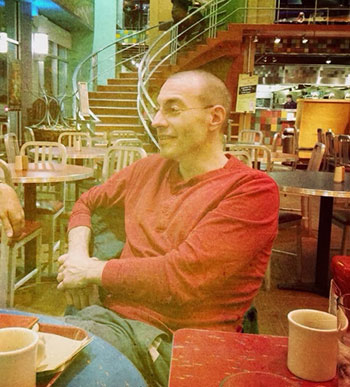Interview with
Steven Conway and Marc Ouellette spoke with me during the 2014 Southwest Popular Culture/American Culture (SWPACA) conference. As they sat at the book table, we discussed first how each of them had gotten involved with LGI. Steven, who works as a lecturer in games and interactivity at Swinburne University of Technology in Melbourne, Australia, specializes in sport and play in games. For him, the collaboration with the Learning Games Initiative (LGI) is relatively new; he's just now laying the groundwork for an Australian version of LGI and hopes to link up his archive with Judd and Ken's. Marc has been involved with LGI for a while longer, citing the 2005 SWPACA conference as one of the initial places where he began presenting about games—prior to the creation of the Game Studies, Culture, Play, and Practice area. They described in the interview clip below these nascent beginnings. [Transcript available here.]
When I asked Steven about some of the research and researchers he was excited about at the moment, he introduced me to interpretative phenomenological analysis (IPA)—not a beer, but a methodology. As he described it, IPA basically involves "just letting people talk about the experience of play on their own terms and then devising a system around that. So it really does come from the player's experience rather than me saying, 'This is what you’ve experienced, you just don’t know it.'" Hear more about Steven's research interests, including researchers he favors, in the clip below. [Transcript available here.]
Marc Ouellette, who described himself as "currently unaffiliated," explained that his background is in gender and cultural studies; in our interview clip below, he described his research as focusing on the cognitive dissonance surrounding gender in games: "So now I find myself asking what’s the cognitive dissonance that causes game studies and gamers to be so retrograde in their understanding of gender, which I find to be just a fascinating thing. ... I'm not interested in blame, I’m not interested in any of those questions, assigning good, bad, or otherwise. I want to know how and why." [Transcript available here.]
I asked each LGI member about researchers they admired in an attempt to learn more about the work that they followed; Marc and Steven had an impressive list that ranged from scholars of game studies to others outside the field as well. The clip below from our interview outlined the scholars they follow. [Transcript available here.]
I posed questions about the relationship between social media and games to each interviewee, and Steven offered an interesting look into how that relationship can either throw a game into development hell or lift up a game through a process that Australians call "spruiking," promoting or publicizing widely. He recounted the differences between Ubisoft's latest Thief game compared to Deus Ex: Human Machine in the clip below. [Transcript available here.]
Works by LGI Members
This section includes a bibliography of scholarly resources and further reading on games written by Learning Games Initiative Members.
Click HereAdvice and Resources
This section provides advice for those who wish to enter the field of game studies. It also describes further resources for those interested in research on games.
Click HereAbout the Interviewer
This section introduces the interviewer, Stephanie Vie (at the University of Central Florida), and describes her work with video and computer games.




